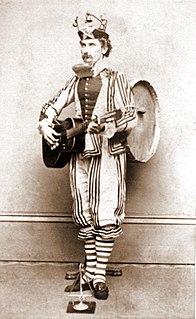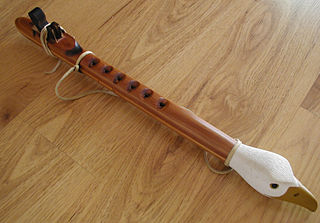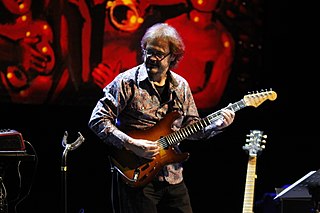
A musical ensemble, also known as a music group or musical group, is a group of people who perform instrumental or vocal music, with the ensemble typically known by a distinct name. Some music ensembles consist solely of instruments, such as the jazz quartet or the orchestra. Some music ensembles consist solely of singers, such as choirs and doo wop groups. In both popular music and classical music, there are ensembles in which both instrumentalists and singers perform, such as the rock band or the Baroque chamber group for basso continuo and one or more singers. In classical music, trios or quartets either blend the sounds of musical instrument families or group together instruments from the same instrument family, such as string ensembles or wind ensembles. Some ensembles blend the sounds of a variety of instrument families, such as the orchestra, which uses a string section, brass instruments, woodwinds and percussion instruments, or the concert band, which uses brass, woodwinds and percussion.

This is a list of notable events in music that took place in the year 1964.
The music of Cambodia is derived from a mesh of cultural traditions dating back to the ancient Khmer Empire, India, China and the original indigenous tribes living in the area before the arrival of Indian and Chinese travelers. With the rapid Westernization of popular music, Cambodian music has incorporated elements from music around the world through globalization.

Peter and the Wolf Op. 67, a "symphonic fairy tale for children", is a musical composition written by Sergei Prokofiev in 1936. The narrator tells a children's story, while the orchestra illustrates it. It is Prokofiev's most frequently performed work and one of the most frequently performed works in the entire classical repertoire. It has been recorded many times.
Bass or Basses may refer to:

Swirlies is an American indie rock band formed in Boston, Massachusetts, United States, in 1990.

A one-man band is a musician who plays a number of instruments simultaneously using their hands, feet, limbs, and various mechanical or electronic contraptions. One-man bands also often sing while they perform.

Jerod Impichchaachaaha' Tate is a Chickasaw classical composer and pianist. His compositions are inspired by American Indian history and culture, and he makes use of traditional instruments.

Raymond Carlos Nakai is a Native American flutist of Navajo/Ute heritage. Nakai played brass instruments in high school and college, and auditioned for the Armed Forces School of Music after a two-year period in the United States Navy. He began playing a traditional Native American cedar flute after an accident left him unable to play the trumpet. Largely self-taught, he released his first album Changes in 1983, and afterward signed a contract with Canyon Records, who produced more than thirty of his albums in subsequent years. His music prominently features original compositions for the flute inspired by traditional Native American melodies. Nakai has collaborated with musicians William Eaton, Peter Kater, Philip Glass, Nawang Khechog, Paul Horn, and Keola Beamer. He has received 11 Grammy Award nominations for his albums.

Uakti (WAHK-chee) was a Brazilian instrumental musical group that was composed of Marco Antônio Guimarães, Artur Andrés Ribeiro, Paulo Sérgio Santos, and Décio Ramos. Uakti was known for using custom-made instruments, built by the group itself.

The Native American flute is a flute that is held in front of the player, has open finger holes, and has two chambers: one for collecting the breath of the player and a second chamber which creates sound. The player breathes into one end of the flute without the need for an embouchure. A block on the outside of the instrument directs the player's breath from the first chamber—called the slow air chamber—into the second chamber—called the sound chamber. The design of a sound hole at the proximal end of the sound chamber causes air from the player's breath to vibrate. This vibration causes a steady resonance of air pressure in the sound chamber that creates sound.
Bill Miller is a Native American singer/songwriter and artist of Mohican heritage. He is a guitarist, player of the Native American flute and painter.
Hugo Martin Montgomery "Dirk" Campbell is a British multi-instrumentalist, composer and energy company executive. Campbell was born in the British military hospital in Ismailia, Egypt, and lived in Kenya till 1962, so was exposed to indigenous Arab and African music before its alteration by western influence. He studied Stravinsky and formed the progressive rock band Egg in 1968 with Dave Stewart and Clive Brooks. In 1972 he studied composition at the Royal College of Music, gaining an ARCM diploma in 1974. He composed the score to David Anderson's BAFTA-winning animated film Dreamland Express in 1983 and began a full-time career as composer in 1989 with film and commercials commissions from Redwing Films. He has since written scores for film, television, advertising, radio and stage. He is adept on a wide range of ethnic folk instruments which have led to recording work in film, television and computer games. He has created or contributed to several instrumental sound libraries distributed by ILIO Entertainments, World Winds, Origins, Music House, SOHO, Production Music Online, and others.

Pedro Eustache is a Venezuelan-born multidirectional soloist flautist, reed player, world woodwind player, wind synthesist, researcher, composer, lecturer, and instrument maker with extensive academic studies and more than 40 years of professional experience. He has more than seven years of symphonic experience and a collection of around 600 instruments from all over the world, many of which having been designed, built and/or modified by himself.
Sean Hickey is an American composer, born 1970 in Detroit, Michigan, and currently based in New York.

The Bob Cole Conservatory of Music is the school of music at California State University, Long Beach. In March 2008, the music department was renamed the Bob Cole Conservatory of Music in honor of an endowment gift of $16.4 million from the estate of Robert "Bob" Cole. Cole, a Long Beach real estate investor, long-time music lover, and amateur pianist, who died in 2004. Following its disbursement, the gift will benefit the students of the conservatory in the form of scholarships and other awards.

Federico "Freddy" Ramos is a Uruguayan guitarist, arranger, producer and composer based in Santa Monica, California.
Simon Steen-Andersen is a Danish composer and installation artist.
Jeff Carpenter is an award winning musician and songwriter with the all Native American orchestral rock band Injunuity.











